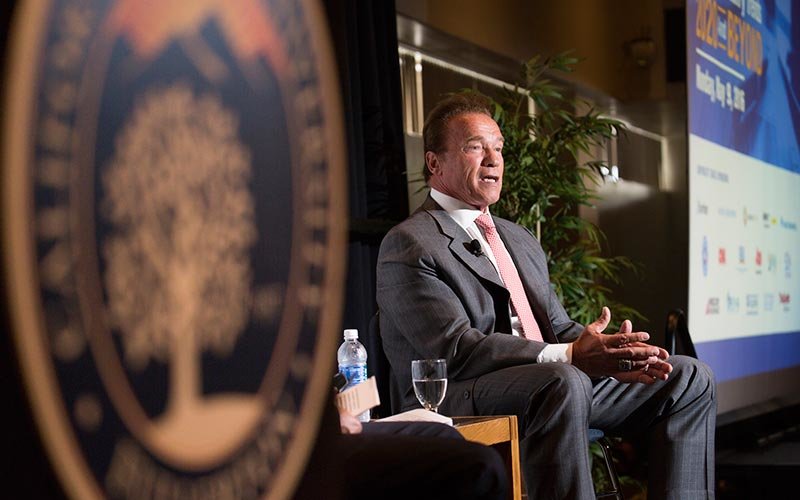
Insurance professionals and students alike gave a standing ovation to Arnold Schwarzenegger following an hourlong talk May 9 in which the former California governor discussed what motivated him throughout his many careers, including running for the state’s highest office in 2003.
Schwarzenegger’s talk was part of the “Insurance Industry Trends 2020 and Beyond” spring forum hosted by Mihaylo College of Business and Economics’ Center for Insurance Studies. Approximately 400 attended the afternoon function that also featured a keynote address by Robert Hartwig, president of the Insurance Information Institute, and a panel discussion with industry leaders.
“I was fortunate to have had many careers,” said Schwarzenegger, who first came to the U.S. as a champion body builder. He would later gain fame as an actor, filmmaker, businessman and politician. “It is important to have a vision. If you have a vision, then you know where you want to go. Passion and vision will take you there.”
On his bodybuilding career: “I wanted to be the best in something. I tried swimming, soccer and shot putt but when a coach suggested weight lifting, I saw that I really had potential,” Schwarzenegger said. “It was great when I was young but then it came time to move on.”
When he decided to become an actor, people told him that with his accent, his size and his name, he wouldn’t make it. “But I did it,” he said. “I put the same amount of work into it as I did in bodybuilding. I focused on it and went for it …
“You know being afraid to fail holds people back,” he said. “Winners get up, losers stay down.”
He switched careers again when he decided to run for governor in the special recall election in 2003.
“I heard all the same type of arguments” that he had heard when he went into acting, he said, “but I went for it anyway.”
Schwarzenegger was elected in 2003 and served eight years. He discussed his efforts to deal with the state budget, California’s aging infrastructure, redistricting and pollution, especially global warming — issues he saw as common sense “people issues,” not political party issues. All politicians, he stressed, should be “public servants, not party servants.”
His goal as governor, he said, was to represent all the people of California. If he had one regret — “only a little bit” — it was not being able to run for president of the United States. “Everything that I have accomplished was because I came to America.”